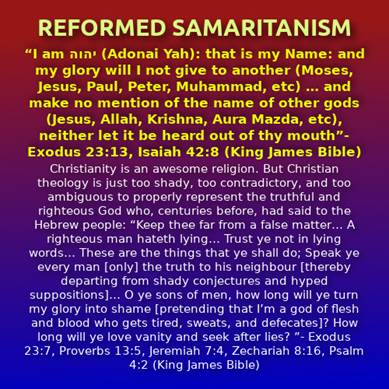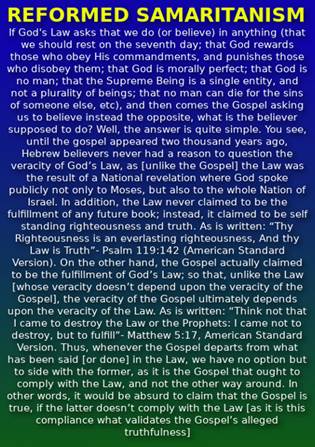 |
Seguir un credo [o religión] que niega el gratuito perdón Divino, es seguir una vanidad ilusoria
|
|
|
|
Seguir un credo [o religió n] que niega el gratuito perdó n Divino, es seguir una vanidad ilusoria
Pecado no es otra cosa sino el sentido de separació n que experimenta el hombre cuando se rebela contra lo ordenado por su Creador (no robes, no mates, no mientas, no deshonres a tus padres, no explotes a los dé biles e inocentes, no codicies lo ajeno, etc).
Pero, como el Creador es un Padre compasivo (“Como el padre se compadece de los hijos, Se compadece Dios de los que le temen”- Salmo 103: 13), pues siempre está dispuesto a ofrecer su gratuita misericordia a todo aquel que la pide con un corazó n contrito y humillado (“Los sacrificios de Dios son el espí ritu quebrantado; Al corazó n contrito y humillado no despreciará s tú, oh Dios”- Salmo 51: 17;
“El que encubre sus pecados no prosperará; Mas el que los confiesa y se aparta alcanzará misericordia”- Proverbios 28: 13; “Quizá oiga la casa de Judá todo el mal que yo pienso hacerles, y se arrepienta cada uno de su mal camino, y yo perdonaré su maldad y su pecado”- Jeremí as 36: 3).
Así las cosas, cuando algú n credo niega la gratuita misericordia Divina, reclamando en cambio que no hay perdó n para el hombre que no cree primero en tal o cual persona [Moisé s, Jesú s, Pablo, Muhammad, Elena G. De White, etc]; en tal o cual libro [el Talmud, el Nuevo Testamento, el Qur’an, el Libro de Mormó n, etc]; o en tal o cual religió n [Judaí smo, Samaritanismo, Cristianismo, Islam, Adventismo, etc], sabemos entonces que tal credo (o religió n) sigue la vanidad; pues se cumple en el la Escritura que dice:
“Los que siguen vanidades ilusorias, Su Misericordia abandonan [es decir, renuncian al perdó n gratuito que ofrece Dios a todo hombre]”- Joná s 2: 8.
Pero la Escritura promete que llegara el dí a cuando quienes siguen estas vanidades, comprenderá n finalmente lo extraviado de su proceder [siendo así libertados de su error]. Como esta escrito: «Oh י ה ו ה , fortaleza mí a y fuerza mí a, y refugio mí o en el tiempo de la aflicció n, a ti vendrá n naciones [gentiles] desde los extremos de la Tierra, y dirá n: “Ciertamente mentira poseyeron nuestros padres, vanidad, y no hay en ellos provecho”»- Jeremí as 16: 19

" Hijos de los hombres, ¿ hasta cuá ndo volveré is mi honra en infamia, Amaré is la vanidad, y buscaré is la mentira? " - Salmo 4: 2
Beware of Paul’s Christianity!
Christianity is an awesome faith. But Christian theology could properly be described as “Paul’s own religion”. Why? Simply because Paul (Saul of Tarsus) was the author of most of the letters comprising the New Testament. In other words, the New Testament isn’t really about Jesus words, but rather about Paul’s words; about what Saul personally considered to be the actual meaning of Jesus original words.
But in this regard, the believer ought to be extremely careful, as Saul had a knack for making exaggerated claims; like claiming to be “a Hebrew of Hebrews” (Philippians 3: 5), when in fact he didn’t even know such a basic thing as who was the Hebrew High priest (Acts 23: 5).
In fact, the believer must be extremely careful when placing a blind trust on anything said [or done] by noble Saul of Tarsus. Why? Again, because Saul seems to have suffered from some sort of mental unbalance (torment? ). And the former made him often describe himself [as well as his gospel interpretation] using words like “foolish” (or “mad”); something no sound minded Hebrew prophet would ever even consider.
As is written: “What I am saying, I am saying not according to the Lord, but as in foolishness... ” (2 Corinthians 11: 17); “I wish that you would put up with a little foolishness from me... ”- (2 Corinthians 11: 1); “I say again, let no one consider me to be a fool. But if you do, accept me as a fool... ”(2 Corinthians 11: 16); “God was pleased—through the foolishness of the message proclaimed—to save those who believe... ” (1 Cor. 1: 21).
What rational explanation could we possibly give to Saul’s words [and actions]? Well, maybe we should keep in mind that, when King Saul became proud and arrogant, God allowed him to be tormented by an evil spirit that would restrain his exaggerated pride. As it is written: “The Spirit of God departed from Saul, and an evil spirit tormented him... ” - 1 Samuel 16: 14.
Likewise, when Saul of Tarsus became proud and arrogant, God allowed him to be tormented by an evil spirit that would restrain his exaggerated pride. As it is written: "... I was given a thorn in my flesh, a messenger of Satan to slap me, so that I would not be exalted" - 2 Corinthians 12: 7.
Sadly, just as King Saul’s punishment included to perish at the hands of his pagan enemies [the Philistines], who would behead him (1 Samuel 31: 8-9), so did Saul of Tarsus punishment include to perish at the hands of his pagan enemies [the Romans], who would behead him.
And the latter means God’s judgment upon Saul was according to his own words (" He said to him- By the words of your own mouth I will judge you, you wicked slave! " - Luke 19: 22). Why? Because Saul had previously stated that a man’s end will be according to his works (“… Their end will be according to their works”- 2 Corinthians 11: 15).
In other words, if a believer chooses to behave as a pagan does [despising God’s Law, just as Paul had despised the Law, calling it a curse and a spiritual slavery], then it is just and proper that such a believer be handed over to the pagans [with whom he properly belongs! ]. May God have mercy of us all. Amen.
|
|
|

|
|
|


